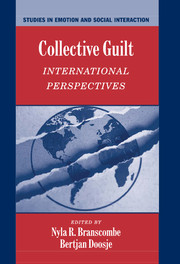Book contents
- Frontmatter
- Contents
- Preface
- List of Contributors
- Collective Guilt
- Section 1 Defining the nature of collective guilt
- Section 2 The Relationship Between Group Identification and Collective Guilt
- Section 3 Consequences for Intergroup Relations
- Section 4 Commentary on the Volume
- 16 Individual versus Group Rights in Western Philosophy and the Law
- 17 A Social Psychological Process Perspective on Collective Guilt
- Index
- References
17 - A Social Psychological Process Perspective on Collective Guilt
Published online by Cambridge University Press: 05 January 2012
- Frontmatter
- Contents
- Preface
- List of Contributors
- Collective Guilt
- Section 1 Defining the nature of collective guilt
- Section 2 The Relationship Between Group Identification and Collective Guilt
- Section 3 Consequences for Intergroup Relations
- Section 4 Commentary on the Volume
- 16 Individual versus Group Rights in Western Philosophy and the Law
- 17 A Social Psychological Process Perspective on Collective Guilt
- Index
- References
Summary
In highlighting the ways in which emotional responses are shaped by historical forces, William Faulkner (1951) asserted that, “The past is never dead. It's not even past.” The empirical research contributions in this volume are a testament to the consequences that group history can have for emotional responses in the present. Although it may be most common for group members to focus on those aspects of their collective past that confer a positive identity and evoke pride, reminders of other aspects of the ingroup's past can lead to more negative emotions. Focusing on events involving harm to another group, including suffering that results from ongoing group-based inequality, can elicit collective guilt. Such guilt can occur even among current group members who played no direct role in the harm doing or circumstances that created the inequality. Because people can and do think of themselves as members of a social group (Tajfel & Turner, 1986), reminders of the ingroup's actions against another group can generate emotional responses. It follows that the antecedents of emotions such as collective guilt will not be rooted in an individualistic conception of the self, but will require categorization of the self in terms of a shared group identity.
The intensity of the emotion evoked when people are confronted with immoral ingroup actions depends on a number of social psychological factors. In this chapter, I distinguish between various theoretical antecedents in terms of their direct versus indirect impact on the experience of collective guilt.
- Type
- Chapter
- Information
- Collective GuiltInternational Perspectives, pp. 320 - 334Publisher: Cambridge University PressPrint publication year: 2004
References
- 57
- Cited by

